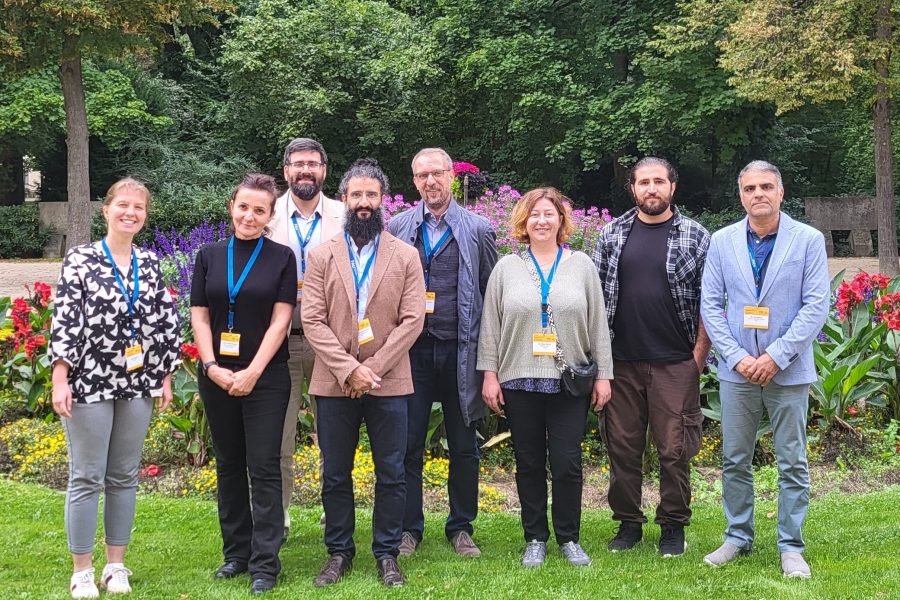October 9, 2025
Research Group Islam and Digitality at the 35th German Oriental Studies Conference
What role does history play in the construction of identity among Muslims online? How do Muslim believers convey Islamic ethics and piety in audiovisual media? How can digital research methods be used to explore Hadith literature, and how do Muslims use prophetic traditions in digital spaces?
These core questions were the focus of the AIWG research group “Islam and Digitality” in three panels at the 35th German Oriental Studies Conference, held from September 8 to 12 at FAU Erlangen–Nuremberg.
The panel organized by the Frankfurt team, which dealt with historical online discourses, included three contributions from the group:
A comparison of representations of key historical events of colonialism in the Middle East and South Asia in the online discourse of revivalist Sunnis showed that marginal groups tend to describe colonial upheavals negatively, whereas the mainstream either ignores them or refers to them positively in the context of their own anti-colonial history.
A broader study examined portrayals of Muslim history on YouTube. This platform-specific online discourse focuses less on events and more on historical figures. The early period of Islam—and especially the Prophet Muhammad—plays a particularly prominent role. An update of image-based representations was illustrated in a presentation on Shi‘i depictions of martyrdom on Instagram. Traditional portrayals of Shi‘i Imams there serve, within politically charged visual material produced by contemporary actors, as markers of martyrdom.
The Erfurt subproject on audiovisual aesthetics presented its research in two contributions.
An analysis of the social media practices of influencers associated with the Ahmadiyya Muslim Jamaat showed that these actors vary their audiovisual modes of presentation depending on platform and topic, while also referencing non-religious online cultures.
The use of AI in video production for Islamic content was the subject of the second paper. The study found widespread use of AI in this context, though the imagery it produces is often clearly derived from Western (pop) culture.
The panel was complemented by a contribution from Dr. Ülker Sözen (University of Leipzig), who spoke about the audiovisual mediation of love, sexuality, and piety in Turkish-language TikTok content. Sözen highlighted that Islamically appropriate love is an important narrative among the largely young target audience.
Dr. Fouad Gehad Marei, the new research fellow of the “Islam and Digitality” group, also presented his project at the Oriental Studies Conference. Since early July, he has been studying virtual reality in Islam through the app VR Karbala. His presentation addressed, among other things, whether VR can serve as a substitute for actual ritual practice. While Marei observed an increasing use of VR in Shi‘i communities and shrines, community members do not see such virtual offerings as replacements, but rather as supplements to traditional rituals.
In the third panel of the research group, the subproject at Humboldt University of Berlin examined prophetic traditions in digital spaces.
One presentation demonstrated the potential of artificial intelligence in Hadith research. A case study on the work Ṣaḥīfah ar-Riḍā, attributed to the eighth Twelver Shi‘i Imam ʿAlī ar-Riḍā, used AI to trace the (including cross-denominational) dissemination of the prophetic traditions it contains and to identify their variants.
Hadith databases and apps specifically designed for engaging with Hadith were the focus of the second presentation. Widely used Hadith databases provide broad access to this genre of sources by publishing major collections online; however, depending on their origin and funding, they are often denominationally shaped—Shi‘i or Sunni.
Beyond simply providing texts, Hadith apps go further by clustering prophetic traditions thematically and thus proposing new interpretive connections.
The research group “Islam and Digitality” will meet in Frankfurt from November 5 to 7. A digitally accessible portion of the event for the academic public is being planned.
The project “Islam and Digitality: Media, Materiality, Hermeneutics” is a joint initiative of scholars of Islamic theology at Humboldt University of Berlin, Goethe University Frankfurt, and the University of Erfurt within the framework of the Academy for Islam in Research and Society (AIWG). It is funded by the BMBF (Federal Ministry of Education and Research).

